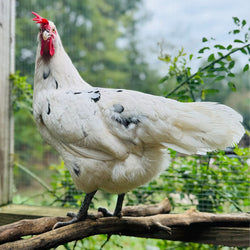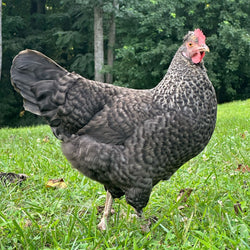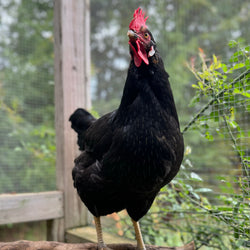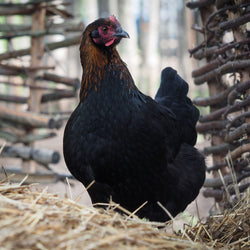page=4/--
Frequently Asked Questions
Here we answer the most commonly-asked questions about ordering, chicken care, and more.
How can I stop my baby chicks from pecking each other in the brooder?
In most cases, you needn't worry. When you first receive them, your little chicks are hungry, and their instincts can tell them to peck at anything to see if it is good to eat: food, funny looking pine shavings, spots on the brooder walls, toes, eyes, freckles on your arm, and anything else. Once they learn what food is, they will not likely peck at anyone else unless they get stressed (too crowded, too hot, etc.), or they are establishing the pecking order. Right now you can sort-of think of them as little toddlers, "testing" everything by trying to put...
Read MoreAre there any concerns I should have when keeping or caring for chickens while pregnant?
You will want to take the same kinds of precautions you would take with any pets: wash your hands after handling them and so forth. Avian and human metabolisms are quite different, so there are few things that affect both humans and birds (even lice that are interested in your chickens are not interested in humans). However, just like cats, birds can get toxoplasmosis. This is the reason pregnant women are advised not to clean a cat box while pregnant. And for that reason, you may want to have your partner clean the brooder or coop while you're pregnant, just...
Read MoreCan I catch bird flu (avian influenza) if I keep chickens?
No. But it's always a good idea to be informed, to practice good biosecurity, and to cook your eggs and meat all the way through.Bird flu, or Avian Influenza (AI), is a viral disease that can infect domestic poultry. There are two types of AI viruses: low pathogenicity (LPAI) and high pathogenicity (HPAI). Whether a virus is LPAI or HPAI depends on the severity of the illness it causes. HPAI is the extremely infectious and deadly-to-birds form of the disease that you've probably heard about. It can spread rapidly from flock to flock. In 2022, the USDA is finding some...
Read MoreHow is Salmonella infection transmitted to chickens in the first place?
You probably don't have to worry about well cared for backyard hens getting ill with salmonella if you provide a clean environment for them. Hens in factory farms usually get infected because they have eaten rat droppings from the conveyor belt that carries their feed. Apart from rat and rodent droppings, chicks can hatch ill with salmonella, having had it passed to them by their mothers. Chickens that are purchased at auctions, shows or other places may pass an illness into your own flock. Chickens that are ill with Salmonella can also pass it to other flock members if their...
Read MoreDemystifying the Salmonella symptoms in chicken: A complete guide
Salmonella infection in chickens is a concern for poultry owners and a potential source of contamination for humans. Understanding Salmonella symptoms in chickens is crucial for your flock's welfare and your family's safety. Some infected chickens may remain asymptomatic, making early detection challenging. In this comprehensive guide, we delve into the various symptoms associated with Salmonella infection in chickens, shedding light on what to watch for and when to seek veterinary assistance. Whether you're a seasoned poultry keeper or new to raising chickens, this article will provide valuable insights into recognizing and managing Salmonella symptoms in your feathered friends. What...
Read MoreWhat is the Biosecurity for Birds campaign and how can I find more information about it?
Biosecurity for Birds is a public awareness campaign started by the U.S. Department of Agriculture�s Animal and Plant Health Inspection Service in 2004. It was designed to educate the growing population of backyard poultry owners on how to keep their flocks healthy. The campaign is focused on public education and reducing the risk of contagious poultry diseases in backyard poultry. This is great for those who keep pet or show chickens, and who want to know how to best keep them safe. For more information about keeping your birds healthy, read the related questions below, or visit the APHIS Biosecurity...
Read MoreHow do I know if my chicken is sick?
We know you love your birds and want to make sure they're healthy. Just like our other animal friends, chickens can become ill. In this article we'll teach you what are the common signs and symptoms of illness, how to hone in on a diagnosis, and finally, help you decide when you'll need to call a veterinarian. How to know if your chicken is sick Chickens can be a bit sneaky, so knowing whether they need medical help can be tough. Here are a few important things to keep in mind. Chickens hide symptoms of illness. Since they are prey...
Read MoreWhat biosecurity should I practice to protect my flock from AI and other illnesses?
Good question! Most illnesses or even infestations (such as mites or worms) are contracted when your birds are exposed to other birds, either directly or indirectly. For that reason, there are simple steps you can take to reduce the chances of exposure and keep your flock healthy. Use common sense and restrict access to your birds and to their area. It's fun to have chicken keeping friends, but remember that allowing visitors to your flock that have been exposed to other birds is one of the main ways illnesses and infestations can get passed from one flock to another Before...
Read More







"The Clubhouse" Coop
Easy to assemble and built to last, the Clubhouse Coop is the perfect starter coop for a small flock.











